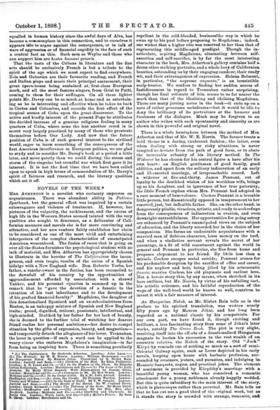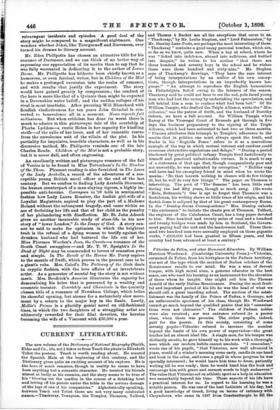NOVELS OF THE WEEK.*
Mits. ATHERTON is a novelist who certainly improves on acquaintance. There was abundant ability in Patience Sparhawk, but the general effect was impaired by a certain extravagance and violence of treatment. If, however, her pictures of the vulgarity, the recklessness, and the excess of high life in the Western States seemed tainted with the very qualities she sought to denounce, as a delineator of Cali- fornian manners and morals she is far more convincing and attractive, and her new venture fairly establishes her claim to be considered as one of the most vivid and entertaining interpreters of the complex characteristics of emancipated American womanhood. The fusion of races that is going on over all the States furnishes the psychological student with no lack of material, and Mrs. Atherton has appropriately chosen to illustrate in the heroine of The Californians the incon- gruous, and even tragic, results of the union of a Spanish hidalgo with a New England wife. Don Roberto Yorba, her father, a ranche-owner in the forties, has been reconciled to the downfall of his country by the opportunities of aggrandisement afforded by association with a shrewd Yankee, and his personal equation is summed up in the remark that he "gave the devotion of a fanatic to the retention of his vast inheritance and to the development of his grafted financial faculty." Magdalena, the daughter of this denationalised Spaniard and an ex-schoolmistress from Boston, is an unhappy mixture of Spanish and New England traits; proud, dignified, reticent, passionate, intellectual, and high-minded. Disliked by her father for her lack of beauty, she is doomed to the further trial of watching her dearest friend realise her personal ambitions—her desire to compel attention by the gifts of expression, beauty, and magnetism— and temporarily detach the allegiance of her lover. Trennahan, the lover in question—if such a word can be applied to the weary viveur who enslaves Magdalena's imagination—is far from being an inspiring hero. There is something peculiarly
• (I) The Californians. By Gertrude Atherton. London: John Lane.— (2.) The Widower. By W. E. Norris. London : William Heinemann. —(3.) An Hungarian Nabob. By Manrns JUIcai. Translated by R. Ni'bet Bain. London : Jarrold and Sons.—(4.) Children of the Mist. By Eden Phillpotts. London : A. D. Inns and Co.— (5 ) In the Shadow of the Three. By Blanche Lottns Tottenham. London: Hutchinson and Co.— 6.) The Loves of the Lady Arabella. By Molly Elliot Seamen. With 111m:tuitions by George Gibbs.
London : Macmillan and Co Corrageen in '98. By Mrs. Orpen. London : Methuen and Co.—(9.) In the Image of God. By A. St. John Adcock. London : Skeffington and Son.—(9 ) Joan, the Curate. By Florence Warden. London: Chatto and Winch:m—(10.) In the Dead of Night. By T. W. Fipeight. London : Jarrold and Sons.-111.) The Revolt of the Horses. By W. (;upland Perry. London: Grant Hichard3.—(12.) The Pathway of the Gods. By Mona Oaird. London : Sketlington and Son.—(13.) Ananias. By the Hon. Mrs. Alan Brodrick. London : Methuen and CO. —114.) Courtship and Chemicals. By Emily Cox. London : Ward, Look, and Co.—(15 ) Mollie's Prince. By Rosa H. °sm. London: Hutchinson and Co. repellent in the cold-blooded, businesslike way in which he owns up to his past before proposing to Magdalena ; indeed, one wishes that a higher role was reserved to her than that of regenerating this middle-aged prodigal. Though the in-- articulate, aspiring Magdalena, alternating between self- assertion and self-sacrifice, is by far the most interesting character in the book, Mrs. Atherton's gallery contains half a. dozen other striking portraits, and a whole bevy of Californian beauties, astounding us by their engaging candour, their ready wit, and their extravagances of expression. Helena Belmont,. in particular, " the supreme coquette," is an irresistible scalp-hunter. We confess to finding her sudden access of fastidiousness in regard to Trennahan rather surprising, though her final estimate of him seems to us far nearer the mark than that of the idealising and idolising Magdalena. There are many jarring notes in the book—it ends up on a. note of rather gruesome melodrama—but it would be idle to deny the brilliancy of its portraiture or the humour and freshness of the dialogue. Much may be forgiven to an author who writes with such spontaneity and sincerity as are shown in this powerful and original novel.
There is a whole hemisphere between the method of Mrs. Atherton and that of Mr. W. E. Norris. The former treats a bold theme in a daring, exuberant fashion; the latter, even when dealing with strong or risky situations, is never tempted to deviate from the path of good form, or to abate the inexorable urbanity of his literary method. In The- Widower he has chosen for his central figure a hero after his own heart : an English gentleman of good family, good• abilities, and apart from the solitary indiscretion of an early' and ill-assorted marriage, of irreproachable record. Left a widower at five-and-thirty, James Pennant, out of loyalty to the deathbed wishes of his worthless wife, brings up as his daughter, and in ignorance of her true paternity, the little French orphan whom Mrs. Pennant had adopted in. a rare moment of benevolence. Cuckoo Pennant is a loveable little person, but diametrically opposed in temperament to her- reserved, just, but inflexible father. She, on the other hand, is dangerously pliable, vivacious, artistic, and ready to seek refuge from the consequences of indiscretion in evasion, and even. downright untruthfulness. Her opportunities for going astray are enhanced by Pennant's emancipated views on the subject- of education, and the liberty accorded her in the choice of her companions. She forms an undesirable acquaintance with a married man of dubious character, loses money on the turf, and when a vindictive servant reveals the secret of her parentage, in a fit of wild resentment against the world in general and Pennant in particular, she flies from home and proposes elopement to her friend. By little less than a miracle Cuckoo escapes social suicide; Pennant atones for his pardonable deception by the sacrifice of office and career,. and his nephew and heir, being jilted by his aristocratic- fiancee, marries Cuckoo, his old playmate and earliest love.. Not a heroic story this, by any means, when sketched in its• bare outlines, but Mr. Norris, by virtue of his unfailing tact, his artistic reticence, and his faithful reproduction of the ways of the well-bred world he knows so well, contrives to invest it with a fair measure of interest.
An Hungarian Nabob, as Mr. Nisbet Bain tells us in the. preface to his spirited translation, was written nearly fifty years ago by Maurus JOkai, and has long been regarded as a national classic by his compatriots. For our own part, we have found it, though exciting and' brilliant, a less fascinating story than some of JOkai's later works, notably The Green Book. The plot is very slight- resolving itself into the efforts of a denationalised Hungarian magnate to hasten his succession to the vast wealth of an eccentric relative, the Nabob of the story. Old "Jockse Kiirpti.hy reminds one of nothing so much as a sort of semi- Oriental Galway squire, such as Lever depicted in his early novels, keeping open house with barbaric profusion, sur- rounded by retainers, jesters, and parasites, and indulging in. Homeric banquets, orgies, and practical jokes. The element. of sentiment is provided by Karpilthy's marriage with a. beautiful young woman, who has conceived a romantic- attachment for a young nobleman already happily wedded- But this is quite subsidiary to the main interest of the story, which is picturesque rather than personal. Mr. Bain tells no that he has cut out a good third of the original work, but as it stands the story is crowded with strange, romantic, an&
extravagant incidents and episodes. A good deal of the story might be compared to a magnificent nightmare. One wonders whether JOkai, like Tourgneneff and Stevenson, ever turned his dreams to literary account.
Mr. Eden Phillpotts has chosen an attractive title for his romance of Dartmoor, and we can think of no better way of expressing our appreciation of its merits than to say that he 'was fully warranted in dedicating it to the author of Lorna Doone. Mr. Phillpotts has hitherto been chiefly known as a humorous, or even farcical, writer, but in Children of the Mist be makes a prolonged excursion into the realm of romance, and with results that justify the experiment. The story would have gained greatly by compression ; the conduct of the hero is more like that of a Quixote than might be expected in a Devonshire water bailiff ; and the sudden collapse of his rival is most inartistic. After pursuing Will Blanchard with fiendish vindictiveness for ten years John Grimbal is con- verted to benevolence all in a moment. Nemo repente fait mitissimus. But when criticism has done its worst there is much to admire in this picturesque tale of the courtship of Phoebe Lyddon—a rustic Helen in her capacity for kindling strife—of the exile of her lover, and of her romantic rescue from the unwelcome suit of the villain of the plot. In his partiality for impulsive, irascible characters, as well as in his discursive method, Mr. Phillpotts reminds one of the late Charles Reade. Children of the Mist is not a probable story, but it is never dull, and often engrossing.
An excellently written and picturesque romance of the fall of Venice is to be found in Miss Tottenham's In the Shadow 'of the Three. Pleasant reading is also furnished in The Loves of the Lady Arabella, a record of the adventures of a sus- ceptible young British naval officer at the end of the last century. But we confess to finding Lady Arabella Stormont, the human counterpart of a man-slaying tigress, a highly im- possible anti-heroine. Corrageen in '98 tells in sentimental fashion how Lady Laura Rossiter, the foolish girl-wife of a Loyalist Magistrate, aspired to play the part of a Madame Roland without the subsequent tragedy, and came within an ace of forfeiting her life and that of her child as the penalty of her philandering with disaffection. Mr. St. John Adcock gives us another inexorable study of slum-life in his new story of " lower London," In the Image of God. A story can- not be said to make for optimism in which the brightest trait is the refusal of a dying woman to testify against the drunken husband who had battered the life out of her. Miss Florence Warden's Joan, the Curate—a romance of the South Coast smugglers — and Mr. T. W. Speight's In the Dead of Night may be commended to lovers of sensation pure and simple. In The Revolt of the Horses Mr. Perry aspires to the mantle of Swift, which proves in the present case to be
giant's robe. Mrs. Caird's The Pathway of the Gods deals in cryptic fashion with the love affairs of an invertebrate artist. As a generator of mental fog the story is not without merit. Mrs. Brodrick's Ananias illustrates the capacity for demoralising his heirs that is possessed by a wealthy and .eccentric testator. Courtship and Chemicals is the quaintly chosen title of a romance of Newnbam College, which belies its cheerful opening, bat atones for a melancholy slow move- ment by a return to the major key in the finale. Lastly, _f'ollie's Prince is a placidly genial novel on old-fashioned lines, in which the two daughters of a struggling artist are ultimately rewarded for their filial devotion, the heroine becoming the wife of a Viscount with 230,000 a year.







































 Previous page
Previous page